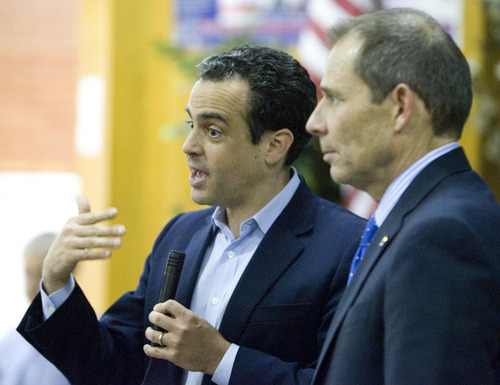This is an archived article that was published on sltrib.com in 2013, and information in the article may be outdated. It is provided only for personal research purposes and may not be reprinted.
The Provo Municipal Council voted Tuesday to approve the sale of its financially-troubled iProvo fiber-optic Internet to Google, paving the way for it to become Google Fiber.
The seven-member council voted unanimously to approve the sale, making Provo the third metropolitan area in the U.S. to be a "Google Fiber city." Google already announced that Google Fiber would be built in the Kansas City area and Austin, Texas.
But in the case of Provo, the network will not be built from the ground up as in the case of Kansas City and Austin, but will be built upon an existing municipal network.
Google Fiber will provide up to a gigabit — or more than 1,000 megabits — per second of download and upload speeds to the Internet, more than 100 times faster than the average Comcast connection, for example.
"It gets back to our origins as a company… our customers cared about speed," Google's director of community affairs, Matt Dunne, said about why they are building Google Fiber.
Money will not exchange hands in the deal except for a nominal $1. Instead, Google will take control and ownership of the iProvo network in exchange for providing free basic 5-megabit Internet connectivity to all of Provo's residents for seven years. Google also will upgrade the existing network and make sure that all homes have accessibility to it. Finally, Google will offer free gigabit service to 25 public institutions, including public schools and recreation centers.
But Provo taxpayers will still have to pay off a $39 million bond that the city originally issued to build the network. With interest, taxpayers still have to pay $3.3 million in bond payments per year for the next 12 years.
Provo Mayor John Curtis also revealed Tuesday that the city will have to front additional money that was not mentioned before.
The city will have to pay about $722,000 for equipment in order to continue using the gigabit service for government operations already using the network, such as the operation of traffic lights and police and fire services. Meanwhile, Google will lease the network to Provo city for free for 15 years.
The city also has to pay about $500,000 to a civil engineering firm to determine exactly where the fiber optic cables are buried, a requirement by Google. Curtis admitted that the construction company that installed the fiber cables underground did not keep records of where they buried all of them.
Finally, Provo has the option to pay another $500,000 for an insurance policy to help mitigate any possible legal damages should Provo's network not be presented to Google as promised.
Curtis said the additional $1.7 million will come from an existing network fund and there will be "no additional taxation from the residents."
During the hearing, residents expressed their excitement for the new network, which will become available to citizens sometime this year.
Royce Van Tassell, vice president of the Utah Taxpayers Association and longtime critic of another Utah municipal fiber-optic network, UTOPIA, said, however, he wished more time had been spent to allow public comment on the sale. The city only allowed five days for the public to comment on the matter since the announcement of the sale.
"There are serious questions about the costs. Those kinds of question have to be asked," he said. "That said, given all the situation, this is a quantum leap. . .it's probably the best we can do [with the financially failing network]."
CenturyLink, an Internet service provider, also sent a letter to Curtis asking for a 30-day delay on the vote, claiming the city did not give ample time or opportunity for other competitors to submit bids for the network.
Google+: +Vincent Horiuchi



